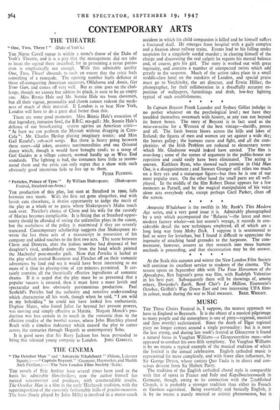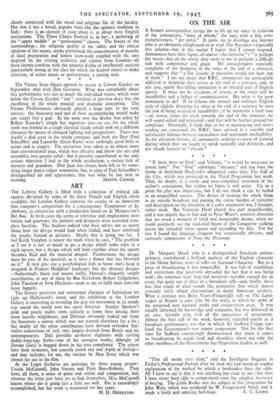MUSIC
THE Three Choirs Festival is, I suppose, the nearest approach we have in England to Bayreuth. It is the object of a musical pilgrimage to many people and the atmosphere is one of piety—regional, musical and (less overtly) ecclesiastical. Since the death of Elgar regional piety no longer centres around a single personality : but it is none the less strong, and during last week's festival at Gloucester it found a natural focus in Vaughan Williams—a Gloucestershire man—who appeared to conduct his own fifth symphony. Yet Vaughan Williams is by no means a typical example of the musical tradition of which the festival is the annual celebration. English cathedral music is represented far more completely, and with fewer alien influences, by Sir George Dyson, whose cantata Quo Vadis is in direct and con- scious descent from Sir Hubert Parry.
The tradition of the E,pglish cathedral choral style is comparable with that of opera in France and Italy and Kapellmeistermusik in Germany, though, owing to its connection with the 7.23tablished Church, it is probably a stronger tradition than either its French or German equivalent. Being essentially and basically English, it is by no means a purely musical or artistic phenomenon, but is closely connected with the social and religious life of the locality. Not that it has a broad, popular basis like the operatic tradition in Italy: there is an element of caste about it, as about most English institutions. The Three Choirs Festival is, in fac*, a gathering of the "upper middle" or " professional " classes. The beauty of the surroundings ; the religious quality of the older, and the ethical idealism of the newer, works performed; the consciousness of months of local preparation and honest team-work coupled with the awe inspired by the visiting orchestra and soloists from London—all these factors combine with the national dislike of intellectual analysis (particularly strong in the class for which the festival exists) to make criticism, of either music or performance, a jarring note. * * * *
The Vienna State Opera opened its season at Covent Garden on September t6th with Don Giovanni. What was iemarkable about this performance was not so much the individual voices, which were below the Covent Garden " star " standard of pre-war days, but the excellence of the whole musical and dramatic conception. The Vienna Philharmonic obviously played a large part in the total success: the buoyancy and tact of their accompanying would make any singer feel a god. In the same way the drama was aided by Robert Kautsky's simple but ingenious sets—or set, for the whole work was framed in a single classical facade which took on a different character by means of changed lighting and perspectives. There was hardly% dud actor in the whole company, and both the Don (Paul Schoeffler) and Leporello (Erich Kunz) were strikingly good both as actors and as singers. The recitatives were taken at an almost more than conversational pace, which was effective and threw the airs and ensembles into greater relief : but it possibly contributed to the only serious objection I had to the whole production, a certain lack of mystery and grandeur. Don Juan has always been felt to be some- thing larger than a vulgar womaniser, but, in spite of Paul Schoeffler's distinguished air and appearance, that was what he ran near to



































 Previous page
Previous page